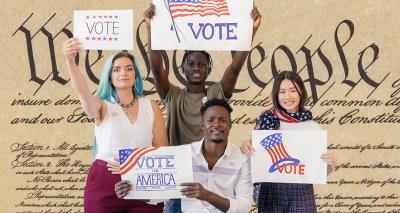The United States Constitution and the Right to Vote

Photo by Mikhail Nilov / Pexels (U.S. Constitution background added)
"No right is more precious in a free country than that of having a voice in the election of those who make the laws under which, as good citizens, we must live. Other rights, even the most basic, are illusory if the right to vote is undermined."
~Justice Hugo Black, Wesberry v. Sanders, 376 U.S. 1,17 (1964)
The United States Constitution came into effect on March 4, 1789. It is the supreme law of the land. The Constitution did not originally define who was eligible to vote. Each state was allowed to determine who had the right to vote. Some states allowed only white adult male property owners to vote. In some states Free Back men could vote if they owned enough property. By 1856 white men were granted the right and privilege to vote in all states even if they did not own property.
Following the Civil War, Congress submitted to the states three amendments as part of its Reconstruction program to guarantee equal civil and legal rights to Black citizens.
- The 13th Amendment constitutionally abolished slavery (1865).
- The 14th Amendment granted citizenship to “All persons born or naturalized in the United States” (1868).
- The 15th Amendment gave Black men the right to vote (1870).
Even after Black men were given the right to vote, they often faced barriers such as poll taxes, literacy tests, and physical violence to prevent them from exercising the right.
American women were denied the right to vote until the passage of the 19th Amendment in 1920. Native Americans born in the U.S. were granted citizenship in 1924 but were denied the right to vote in many states until 1957. In 1961, residents of Washington, D.C. were granted the right to vote in U.S. presidential elections by the 23rd Amendment.
The passing of the Voting Rights Act of 1965 was a notable achievement. But in many instances, a major divide remains between the letter and the spirit of the law. Recent elections have shown that there are ongoing attempts to prevent people from exercising rights granted to them by amendments to the Constitution.
Studying the foundations of our nation and the historic movements to gain equality and justice for all people fuels my passion for being a part of Ending Racism USA. The Constitution is the highest law of the land. Voting is a right. “We the people …” have a sacred obligation to elect leaders who will work to honor the letter and the spirit of the law.
